How to Choose Between a Hound and a Sporting Dog for an Active Family
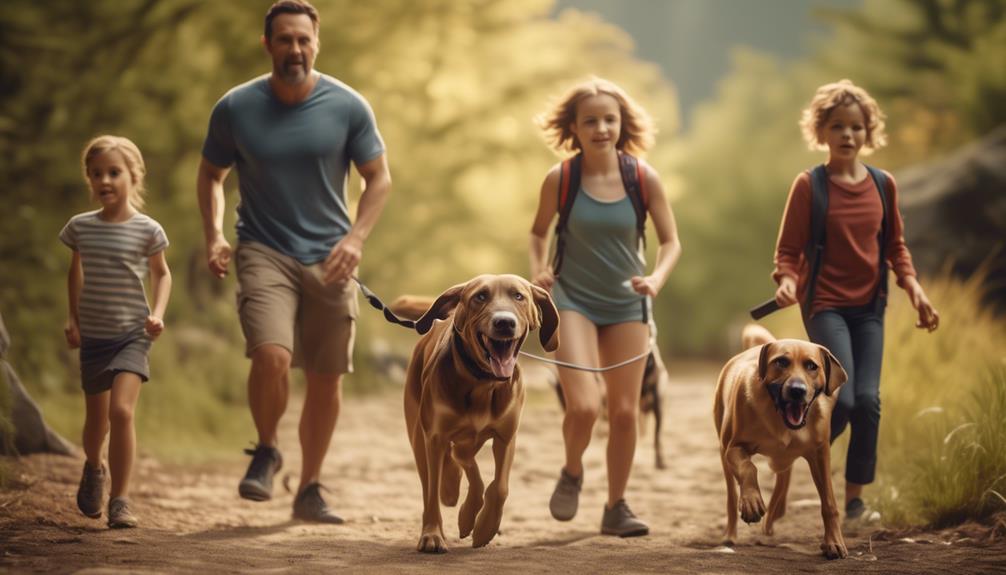
When it comes to choosing the right breed of dog for an active family, there are several factors to consider. One important factor is the dog's energy level and exercise needs. Hound breeds, such as Beagles and Bloodhounds, are known for their high energy levels and need for regular exercise. They are often used for hunting and tracking, which requires a lot of physical activity. On the other hand, sporting dog breeds, like Labrador Retrievers and Golden Retrievers, are also active but tend to have a more moderate energy level. They are often used for activities like swimming and retrieving, which still require physical exertion but may be slightly less intense than the activities hound breeds are used for. Another factor to consider is the dog's temperament and compatibility with children. Both hound and sporting dog breeds are generally good with kids, but some hound breeds may have a higher prey drive and may not be as tolerant of rough play. Sporting dog breeds, on the other hand, are often known for their friendly and gentle nature, making them a good choice for families with young children. In conclusion, both hound and sporting dog breeds can make great choices for active families, but it's important to consider factors like energy level and temperament when making a decision.
Key Takeaways
- Hound dogs are excellent hunting companions but may not be suitable for families with small children or other pets due to their strong prey drive.
- Sporting dogs are gentle and make ideal companions for families with young children, excelling in activities like retrieving and swimming.
- Both hound dogs and sporting dogs require daily exercise to keep them physically and mentally stimulated.
- When choosing between a hound and a sporting dog for an active family, consider the size and space requirements of the breed to ensure they have enough room to roam and exercise.
Hound Vs Sporting Dog: Key Differences
The key differences between Hound dogs and Sporting dogs lie in their natural hunting abilities and temperament, making them suitable for different types of families and lifestyles.
Hound dogs, such as Beagles, are known for their excellent hunting skills and may not coexist well with small children or other pets. Hound breeds, such as Afghan Hounds and Irish Wolfhounds, are gentle giants.
Sporting dogs, like Retrievers, are gentle and make ideal companions for families with young children. Sporting breeds, like Pointers and Setters, are hardy, intelligent, and responsive to training.
In terms of physical attributes, Hound dogs tend to have a natural ability to provide hunting assistance. They possess keen senses and agility that allow them to control the movement of game. This makes them suitable for families that enjoy hunting or participating in activities that require tracking scents over long distances.
Sporting dogs, on the other hand, have been bred for their remarkable endurance and are known for excelling in activities like retrieving, swimming, and search and rescue operations. Their energy levels and agility make them perfect for families that enjoy outdoor activities and sports.
Exercise and Activity Requirements
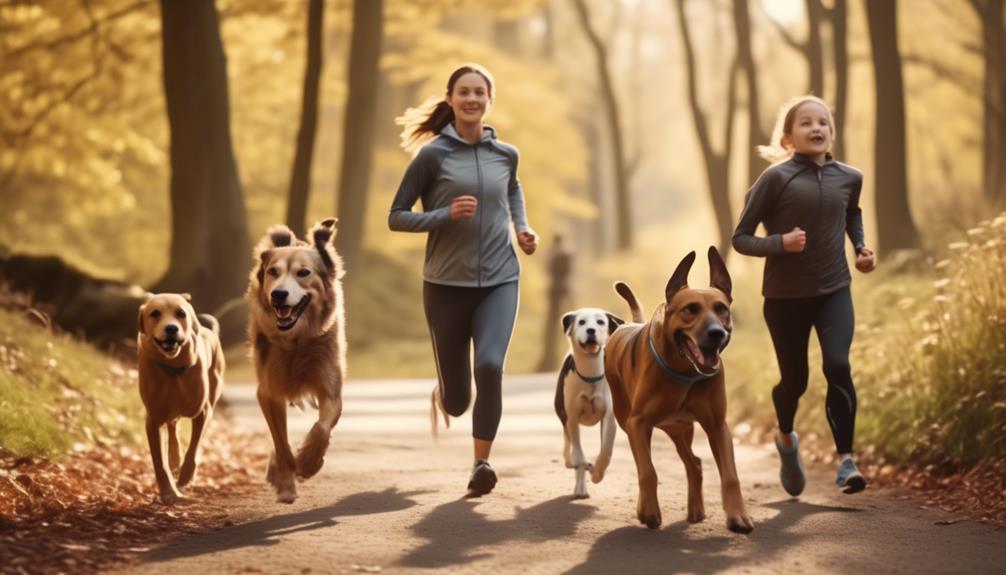
Regular exercise is essential for maintaining the physical and mental well-being of an active dog. When choosing between a hound and a sporting dog for an active family, it's important to consider their exercise and activity requirements.
Both hounds and sporting dogs are bred for their stamina and energy levels, but they've different needs when it comes to exercise.
Hounds, such as the Beagle or the Bloodhound, have a strong instinct to follow scents and are known for their endurance. They require daily exercise to prevent boredom and destructive behavior. Hounds enjoy activities that stimulate their sense of smell, such as scent work or tracking games. Long walks, hikes, and runs are also beneficial for hounds to burn off their excess energy.
On the other hand, sporting dogs, like the Labrador Retriever or the Golden Retriever, were bred for hunting and retrieving. They've high energy levels and need daily exercise to keep them physically and mentally stimulated. Sporting dogs thrive on activities that involve retrieving, such as fetch or agility training. They also enjoy swimming, which is a great way to keep them active and cool during hot weather.
Training and Intelligence Levels

When considering the training and intelligence levels of different dog breeds, it's important to understand how these factors can impact their suitability for an active family. Training and intelligence play a crucial role in a dog's ability to learn and adapt to various activities and commands, making them an essential consideration for families seeking a companion that can keep up with their active lifestyle.
Here are two key points to consider:
- Sporting dogs: Sporting breeds are known for their high intelligence and responsiveness to training. These dogs are quick learners and excel in activities such as agility, obedience trials, and retrieving games. Their natural athleticism and eagerness to please make them excellent choices for families looking to engage in various physical activities with their furry friend.
- Hound dogs: Hound breeds possess a unique set of skills and traits that make them exceptional hunting companions. However, their natural instincts and independence can sometimes make training a bit more challenging. While hound dogs can excel in activities such as scent work and tracking, they may not coexist well with small children or other furry creatures due to their strong prey drive.
Temperament and Family Compatibility
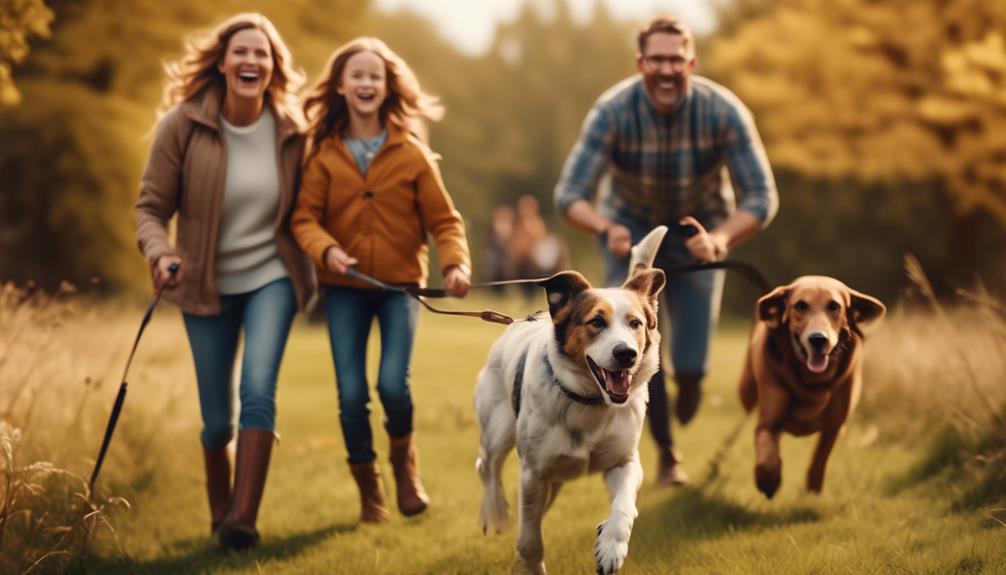
Consider the temperament and compatibility of different dog breeds with your family's lifestyle to ensure a harmonious and fulfilling relationship with your new furry companion.
When it comes to selecting a dog breed for an active family, both hounds and sporting dogs have their unique temperaments and family compatibility considerations.
Hounds, such as Beagles and Afghan Hounds, are generally companionable and adaptable for active families. However, they may not co-exist well with small children or other furry creatures due to their strong hunting instincts. These breeds have a high prey drive and may be easily distracted during training sessions. Therefore, families with young children or other small pets should carefully consider the compatibility of hounds with their family dynamics.
On the other hand, sporting dogs, including Retrievers and Spaniels, tend to have gentle and responsive temperaments. They make ideal companions for families with young children due to their intelligence and trainability. Sporting dogs are typically eager to please and excel in activities such as obedience training and retrieving games. Their gentle nature and adaptability make them suitable for families with an active lifestyle.
Size and Space Considerations
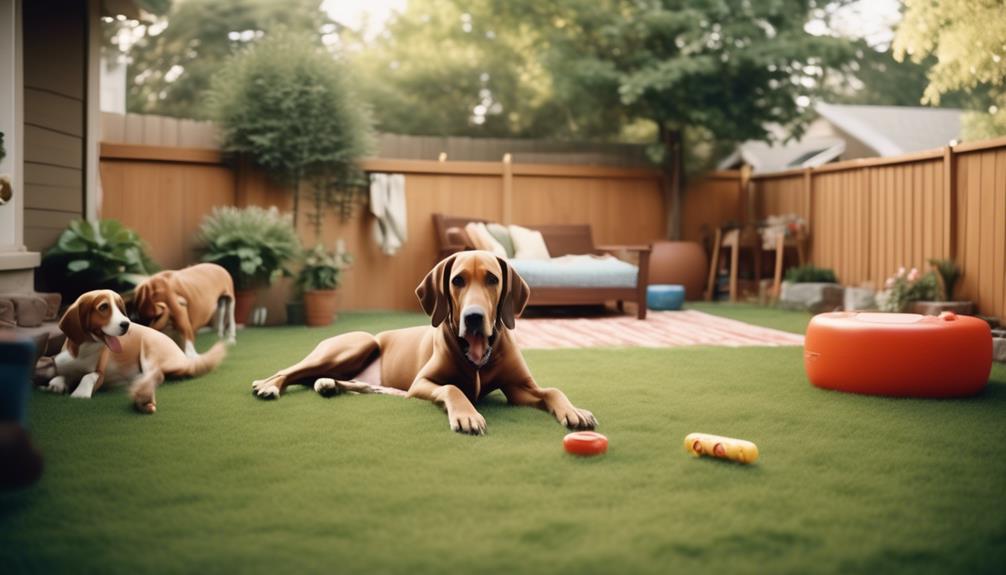
To ensure a harmonious and fulfilling relationship with your new furry companion, it's important to take into account the size of your living space when choosing a dog breed for an active family. The size of your living space will determine the comfort and suitability of certain dog breeds.
Consider the following factors when making your decision:
- Assess the available space: Evaluate the area in your home where the dog will spend most of its time. Determine if there's sufficient room for the dog to move around comfortably. Larger breeds may require more space to roam and exercise, while smaller living spaces may be better suited for medium to small-sized dogs.
- Exercise requirements: Dogs, especially those in active families, need regular physical activity to stay healthy and happy. Consider whether your living space can accommodate the dog's exercise needs. High-energy breeds may require access to outdoor space for activities such as running and playing.
Taking the size of your living space into consideration when choosing a dog breed ensures that you select the best dog for your active family. Consulting resources such as the American Kennel Club can provide valuable information about different dog breeds and their space requirements. By choosing a breed that fits comfortably within your living space, you can create an environment where both the dog and your family can thrive.
Health and Grooming Needs
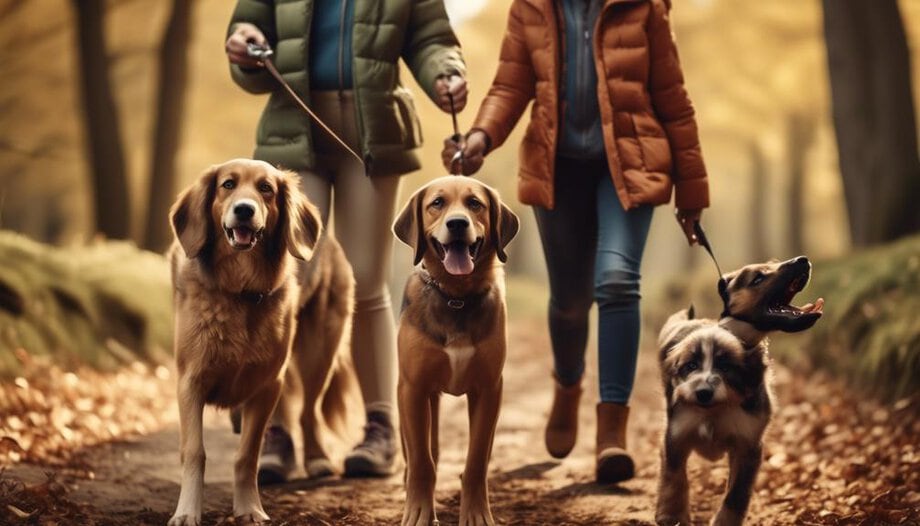
Sporting and hound dogs have specific health and grooming needs that require regular attention and care.
Both Basset hounds and German Shepherds, which fall under the hound and sporting dog categories respectively, have moderate to high grooming needs. This includes regular brushing to maintain their coats and occasional professional grooming.
Regular exercise is crucial for the health and well-being of both types of dogs.
Hound dogs, such as Basset hounds, require special attention to ear care and cleaning due to their hanging ears that can trap moisture and debris, leading to infections.
On the other hand, sporting dogs like the German Shepherd often have dense, water-repellent coats. After water activities, these dogs need thorough drying and grooming to prevent skin issues.
Additionally, both sporting and hound dogs may benefit from regular dental care, including teeth brushing and dental treats, to maintain their oral health.
Making the Final Decision: Which Breed Is Right for You?

With the health and grooming needs of hound and sporting dogs in mind, it's now essential to make the final decision on which breed is most suitable for an active family. Consider the following factors when choosing the right dog breed for your family:
- Temperament and energy level: Evaluate the breed's temperament and energy level to ensure it matches your family's activity level and lifestyle. Some breeds, such as Labrador Retrievers and Vizslas, are known for their high energy and need lots of exercise.
- Size and living environment: Take into account the size of the dog and the space available in your living environment. Larger breeds may require more room to run and play, while smaller breeds may be more suitable for apartments or smaller homes.
When making the final decision, it's important to involve all family members in the process. Discuss their preferences and any potential allergies or sensitivities to specific breeds. Additionally, research the specific needs and characteristics of different dog breeds to find the right fit for your family.
Consider the financial aspects as well, including budgeting for grooming expenses and potential adoption from shelters or rescue organizations. Remember that owning a dog is a long-term commitment, so be prepared for the responsibilities involved and ensure that the chosen breed aligns with your personal preferences and desires to serve others.
Frequently Asked Questions
Are Hound Dogs Good for Families?
Hound dogs can be good for active families. Their temperament varies, but they are generally loyal and affectionate. They may not be the best match for small children or other pets, and their exercise needs can be high. Training challenges should be expected.
What Is the Best Dog for Busy Family?
The best dog for a busy family depends on various factors like lifestyle, energy level, and compatibility with children and other pets. Consider a sporting breed for their intelligence, adaptability, and suitability for active families.
What Are the Cons of Owning a Hound?
Owning a hound has its pros and cons. Hounds can be challenging to train due to their independent nature. They require plenty of exercise and may have a strong prey drive. Some hounds are prone to separation anxiety and have specific health concerns.
What Is the Best Behaved Hound Dog?
The best behaved hound dogs are those with a calm and gentle temperament, such as the Afghan and Irish Wolfhounds. These breeds require proper training and socialization to thrive as family pets for active families.









